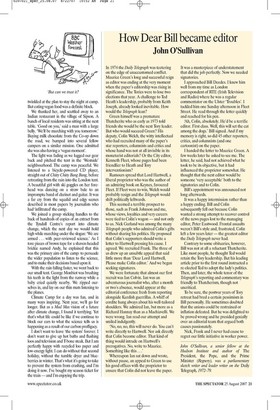How Dear Bill became editor
John O'Sullivan In 1974 the Daily Telegraph was teetering on the edge of unaccustomed conflict. Maurice Green's long and successful reign as editor was ending at the very moment when the paper's editorship was rising in significance. The Tories were to lose two elections that year. A challenge to Ted Heath's leadership, probably from Keith Joseph, already looked inevitable. How would the Telegraph lean?
Green himself was a premature Thatcherite who as early as 1973 told friends she would be the next Tory leader. But who would succeed Green? His deputy, Colin Welch, the witty intellectual who had recruited many of the paper's star reporters, columnists and critics and whose hand was not at all invisible in its monetarist editorials? Or the City editor, Kenneth Fleet, whose pages had been friendlier to Heath and Tory interventionism?
Rumours spread that Lord Hartwell, a liberal proprietor who was the author of an admiring book on Keynes, favoured Fleet. If Fleet were to win, Welch would probably resign and the Telegraph would shift politically leftwards.
This seemed a terrible prospect to those, such as Frank Johnson and me, whose views, loyalties and very careers were tied to Colin's wagon — and not only to us. Nick Garland was among the many Telegraph people who admired Colin's gifts without sharing his politics. He proposed that Colin's supporters should write a letter to Hartwell pressing his cause. I agreed. We recruited Frank. The three of us drew up an unsubtle appeal that said little more than 'Dear Lord Hartwell, Please make Cohn editor.' And we began seeking signatures.
We were fortunate that almost our first recruit was Ian Colvin. Ian was an adventurous journalist who, after a month or two's absence, would appear at the editorial conference fresh from reporting alongside Kurdish guerrillas. A whiff of cordite hung always about his well-tailored shoulders. We admired Ian, but more as a Richard Hannay than as a Machiavelli. We were wrong. Ian read our attempt and smiled indulgently.
'No, no, no, this will never do. You can't write directly to Hartwell. Nor ask directly that Cohn become editor. That kind of thing would intrude on Hartwell's prerogatives. No, write to Maurice. Something like this ...'
Whereupon Ian sat down and wrote, without pause, an appeal to Green to use his good offices with the proprietor to ensure that Cohn did not leave the paper.
It was a masterpiece of understatement that did the job perfectly. Now we needed signatories.
I approached Bill Deedes. I knew him well from my time as London correspondent of RTE (Irish Television and Radio) where he was a regular commentator on the Ulster 'Troubles'. I tackled him one Sunday afternoon in Fleet Street. He read through the letter quickly and reached for his pen.
Ah, Cohn, absolutely. He'd be a terrific editor. First class. Well, this will set the cat among the dogs.' Bill signed. And if my memory is right, so did 45 other reporters, critics, and columnists (and one cartoonist) on the paper.
I handed the letter to Maurice Green. A few weeks later he asked to see me. The letter, he said, had not achieved what he took to be its objective, but it had influenced the proprietor somewhat. He thought that the next editor would be someone 'very acceptable' both to the signatories and to Colin.
Bill's appointment was announced not long afterwards.
It was a happy intermission rather than a happy ending. Bill and Cohn subsequently fell out because Colin wanted a strong attempt to recover control of the news pages lost to the managing editor, Peter Eastwood. Frontal assaults weren't Bill's style and, frustrated, Cohn left a few years later — the greatest editor the Daily Telegraph never had.
Contrary to some obituaries, however, Bill was not at all a reluctant Thatcherite. Like most people, he thought Ted would retain the Tory leadership. But his leading article prior to the first round instructed a re-elected Ted to adopt the lady's politics. Then, and later, the whole tenor of the Telegraph's reporting and commentary was friendly to Thatcherism, though not uncritical.
To be sure, the postwar years of Tory retreat had bred a certain pessimism in Bill personally. He sometimes doubted that the unions could be restrained or inflation defeated. But he was delighted to be proved wrong and he presided genially over an editorial team that argued both causes passionately.
Nick, Frank and I never had cause to regret our little initiative in worker power.
John O'Sullivan, a senior fellow at the Hudson Institute and author of The President, the Pope, and the Prime Minister (Regnely), was a parliamentary sketch writer and leader writer on the Daily Telegraph, 1972-79.









































 Previous page
Previous page